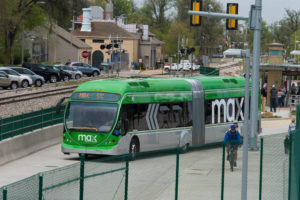Although ATFAB or ASCSU has historically funded Transfort services for students since the 1970’s, since ATFAB’s establishment in 2015, the board has made additional alternative transportation investments to help ensure safe and reliable transportation for students at Colorado State University.
Funded Projects
Transit Investments:
Transfort Basic Investment
Students can utilize their student ID to ride any route within Fort Collins as well as the FLEX route to Loveland, Longmont, and Boulder.
Route 33 to Foothills Campus
ATFAB added route 33 in 2016 to connect CSU’s main campus to our Foothills campus. This route was the final puzzle piece to connect all of CSU’s campuses in Fort Collins to ensure that students don’t need a car to succeed at CSU. Read more about this investment in the Collegian here.
Enhanced Transit Service on West Elizabeth
Some of the most utilized routes in Fort Collins are found on the West Elizabeth Corridor west of CSU, and this is in large due to student ridership. New student housing developments are added in this area often, making student density continuously higher along this corridor. Seeing the need for additional service, ATFAB invested in this corridor in a number of ways. The board funded late night service to West Elizabeth via Route 32, trailer busses to ensure that students weren’t being left behind, and 365 day service routes down this corridor to provide access to campus every day of the year.
365 Day Service
The City of Fort Collins along with ATFAB added 365 day service to routes 2, 3, 8, 14, 16 and the MAX. ATFAB was key in advocating for service along routes 2 and 3 which the board perceived would especially serve students by connecting them to campus and grocery stores. Before this investment, Transfort routes did not run on Sundays or holidays. Here is more information about 365 day service from the Coloradoan and the Collegian.
Poudre Express – January 2019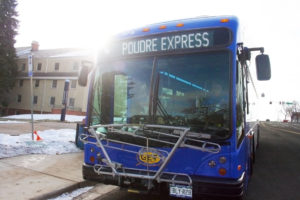
The growing population of Northern Colorado prompted Transfort to conduct surveys and evaluate travel pattern data which revealed a need for regional service between Fort Collins, Windsor and Greeley. The resulting line, named the ‘Poudre Express’, will help reduce the number of cars on the road daily and fill an important transportation gap for citizens in all communities without reliable transportation.
Capital Infrastructure Investments:

Clara Scholtz | The Rocky Mountain Collegian
Green Trail Extension (completed 2018)
The Green Trail runs from the Shields underpass, past the south end of Moby Arena and the Rec Center, and ends at the Lory Student Center. This is a very popular trail- seeing thousands of cyclists and pedestrians every day. Part of the trail was split- meaning that there were separate spaces for pedestrians and cyclists, but just west of the Rec Center, the split path merged into one small trail. This caused congestion and higher rates of crashes. ATFAB invested in extending the split trail from where it initially ended all the way to the new Shields underpass through a partnership with CSU Facilities.
Hughes Way Trail (Construction: 2020-21)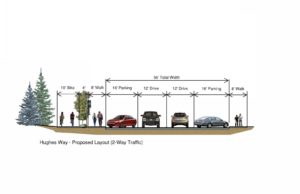
This project will be constructed in conjunction with the new Meridian Village complex. The bicycle/pedestrian trail will run from Shields Street to the Morgan library parking lot. The existing conditions have bicyclists riding against traffic on the street or sidewalk, creating auto and pedestrian conflicts. The new design will create a two-way bicycle facility on the south side of the roadway, greatly enhancing safety.
Hughes Way Raised Crossings (2023)
 This project aims to improve pedestrian safety on Hughes Way and Pitkin Street. On Hughes Way, the crosswalk between Academic Village and the Intermural Fields will be raised with a speed bump. At that crossing as well as the crosswalk on Pitkin Street between Edwards Hall and Academic Village flashing beacons will be added to draw attention to the crossings, especially at night. Both crossings have been areas of concern for a while as fast traffic on both streets has created unsafe conditions for pedestrians and cyclists, especially at night.
This project aims to improve pedestrian safety on Hughes Way and Pitkin Street. On Hughes Way, the crosswalk between Academic Village and the Intermural Fields will be raised with a speed bump. At that crossing as well as the crosswalk on Pitkin Street between Edwards Hall and Academic Village flashing beacons will be added to draw attention to the crossings, especially at night. Both crossings have been areas of concern for a while as fast traffic on both streets has created unsafe conditions for pedestrians and cyclists, especially at night.
Additional Covered Transit Shelters (2023)
 This project will add four (4) new covered shelters at existing Transfort (bus) stops on the Horn route on campus. The shelters will be equipped with lighting, seating, LED display systems, and audio cues informing riders of the next arrivals. Electrical components will be powered by solar panels on the shelter. In addition to providing safety from weather, comfort, and accessibility, the shelters act as visible markers for new and unfamiliar riders. This project aligns with CSU’s continued relationship with Transfort and our shared goals to improve the public transit options available to CSU students.
This project will add four (4) new covered shelters at existing Transfort (bus) stops on the Horn route on campus. The shelters will be equipped with lighting, seating, LED display systems, and audio cues informing riders of the next arrivals. Electrical components will be powered by solar panels on the shelter. In addition to providing safety from weather, comfort, and accessibility, the shelters act as visible markers for new and unfamiliar riders. This project aligns with CSU’s continued relationship with Transfort and our shared goals to improve the public transit options available to CSU students.
University Avenue & Library Design Study (2019-2020)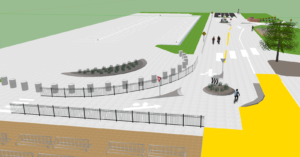
This study encompasses University Avenue running from Meridian to the dismount zone on the north west corner of Morgan library. The well trafficked existing roadway currently has minimal striping causing bicyclists and pedestrians to not adhere to the traffic pattern. This area will be studied to improve the infrastructure, and therefore safety.
Monfort Quad Crossing Trail (2021)
 The new Monfort Quad Crossing Trail will run from the Plant Science building to the Animal Science building. The trail will expand the current side walk into one with an additional 16′ wide bike lane. The current sidewalk in the Monfort Quad is too small to accommodate both pedestrians and bikers, but with the newly funded trail, bikers and pedestrians will be able to safely traverse. The image on the right displays where the new bike trail is going to be and how the trail also allows for fire access as requested by the Poudre Fire Authority.
The new Monfort Quad Crossing Trail will run from the Plant Science building to the Animal Science building. The trail will expand the current side walk into one with an additional 16′ wide bike lane. The current sidewalk in the Monfort Quad is too small to accommodate both pedestrians and bikers, but with the newly funded trail, bikers and pedestrians will be able to safely traverse. The image on the right displays where the new bike trail is going to be and how the trail also allows for fire access as requested by the Poudre Fire Authority.
Amy Van Dyken Way Contraflow Bike Lane (2020)
 This project will allow for a new contraflow bike lane that would accommodate a legal bike movement north to the oval. As of today, many bikers are illegally riding towards traffic to make this movement to the Oval. This new bike lane will provide a protected contraflow lane that will greatly improve the safety of the bikers as well as the drivers, while still maintaining parking along the street. The image on the right displays what this new contraflow bike lane will look like with the parking away from the curb and the new bike lane allowing for bikers to safely navigate Amy Van Dyken Way.
This project will allow for a new contraflow bike lane that would accommodate a legal bike movement north to the oval. As of today, many bikers are illegally riding towards traffic to make this movement to the Oval. This new bike lane will provide a protected contraflow lane that will greatly improve the safety of the bikers as well as the drivers, while still maintaining parking along the street. The image on the right displays what this new contraflow bike lane will look like with the parking away from the curb and the new bike lane allowing for bikers to safely navigate Amy Van Dyken Way.
Programmatic Investments:
Spoke (2018-2023)

The Spoke, a living lab, is Colorado State University’s on-campus cycling maintenance and educational training center servicing our University students, faculty, and staff. The University’s living lab is operated by students, where it is their goal to work with each of our customers, sharing knowledge, techniques and best practices on bicycle maintenance, safety, and repairs. ATFAB partnered with Central Receiving and Housing & Dining Services to add a mobile shop to extend the Spoke’s reach. Learn more about the Spoke through their website and Instagram.
SkiSU (Winters 2018-2023)
Skiing and snowboarding is a huge part of Colorado culture, and many out of state students choose CSU because of the proximity to ski resorts. SkiSU provides students with the opportunity to connect to Colorado’s ski resorts via bus. Learn more about SkiSU, trip dates and locations, and cost here.
Rams Ride Right (2019-2020, 2020-2021)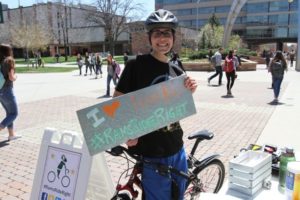
This positive reinforcement campaign encourages safer and more lawful bicycling practices by rewarding students who are observing traffic laws at targeted hot spots on campus. This program is fostering a culture of safety among students on campus and setting the tone for new student arrivals. More in formation about Rams Ride Right can be found here.
CSU Police Department Electric Bikes (2019-2020)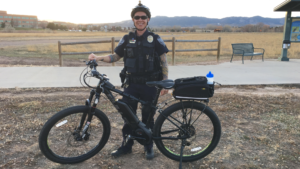
The CSU Police Department has sworn police officers who focus their interactions with community members utilizing bicycles as opposed to being full-time in a patrol car. This investment has helped provide electric bicycles to assist officers in contacting individuals who are traveling faster than a traditional bicycle.

